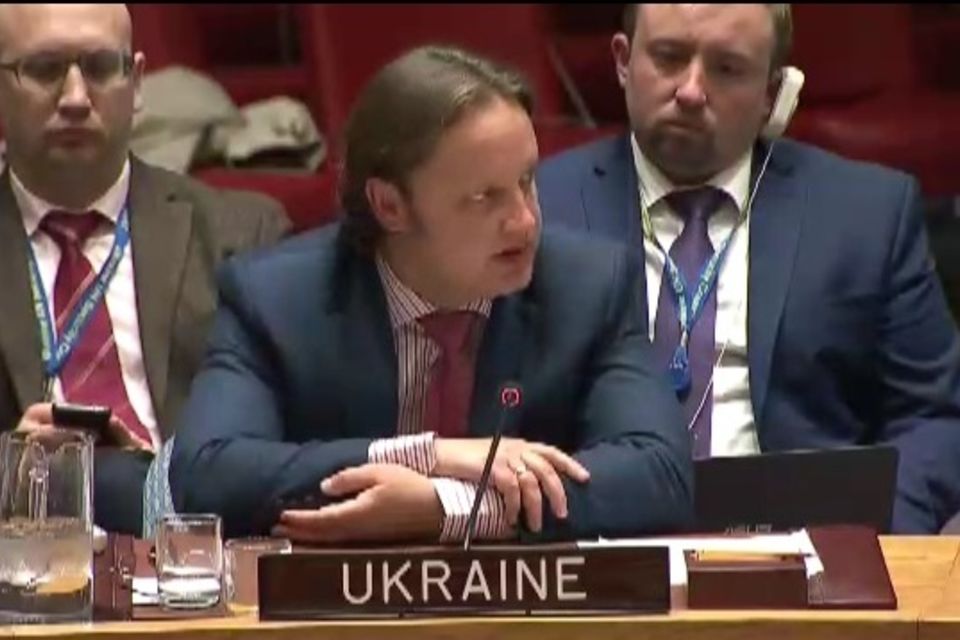Виступ делегації України на брифінгу РБ ООН щодо співпраці між Лівією та Міжнародним кримінальним судом

Mr. President,
I would like to thank ICC Prosecutor Bensouda for her informative update on her Office’s work. We appreciate the way you are carrying out your mandate.
Let me start with the situation in Libya, which, as we just heard, is still extremely difficult with an ongoing political deadlock and escalation of tensions. Many warring parties keep on committing serious crimes and grave violations of human rights, including executions, killings, abductions, torture, unlawful detentions, desecration of corpses, etc.
The practice of imprisonment without trial for an indefinite period of time, outside the legal fold, continues to be widespread. A telling example of such an unlawful practice is detention of 4 Ukrainians who have been kept in custody since August 2011 without any official arrest warrant. My delegation strongly believes that such an unacceptable situation should not be allowed to continue. The Libyan Law on Justice in the Transition Period requires that the detainees, who are civilians, be transferred to civilian authorities.
We take it that the difficult security situation cannot be an excuse either for non-cooperation with the ICC, or for letting serious crimes to be committed during hostilities. Six years ago this Council adopted resolution 1970 not for the sake of holding regular briefings or repeating the mantra that perpetrators of crimes against humanity in Libya have to be held accountable. Rather, the situation was referred to the ICC Prosecutor for a concrete purpose — to deliver justice.
In this regard, we would like to echo Madame Bensuda’s point that effective investigations and prosecutions can be achieved only through cooperation from States and other actors. It is worth recalling that in resolution 1970 this Council urged all States, including not parties to the Rome Statute, and concerned regional and other international organizations to cooperate fully with the Court and the Prosecutor.
Yet, it is not just non-cooperation and delays in responses to the ICC requests for assistance that impede investigations in existing and new cases, but also the climate of insecurity and impunity that continues to stand in the way of investigative activities in the country.
Under these circumstances, we fully support the remote monitoring and investigations of crimes committed in different parts of Libya carried out by the Office of the Prosecutor on the basis of gathering information from reliable sources. Still, much more could be done to ensure accountability if the ICC personnel were able to work directly in Libya. We welcome active cooperation between the Office and the Libyan Prosecutor-General’s Office on other issues.
We are also grateful to the Prosecutor for providing additional information about the cases against Saif Al-Islam Gaddafi and Abdullah Al-Senussi. In this regard, we urge the Libyan authorities to facilitate the transfer of Mr. Gaddafi to the Court without further delay. Justice needs to be done not only for crimes committed by the previous regime; the impunity must be ended for crimes committed by ISIL-aligned groups and other extremists and militias.
In this context, the international community must further support the Libyan Government of National Accord in its efforts to restore law and order in the country. Comprehensive and lasting resolution to the Libyan crisis will come only through a broad-based political settlement with full commitment of the Presidency Council of the Government of National Accord, House of Representatives, High State Council and other Libyan actors.
In conclusion, I would like to stress that the ICC is not just a venue for delivering justice for the victims, — it is also an effective tool for prevention of future crimes. Thus, we join the call on all States to provide full cooperation to the Court without exceptions or preconditions, which would greatly contribute enormously to strengthening international peace and security.
I thank you, Mr. President
